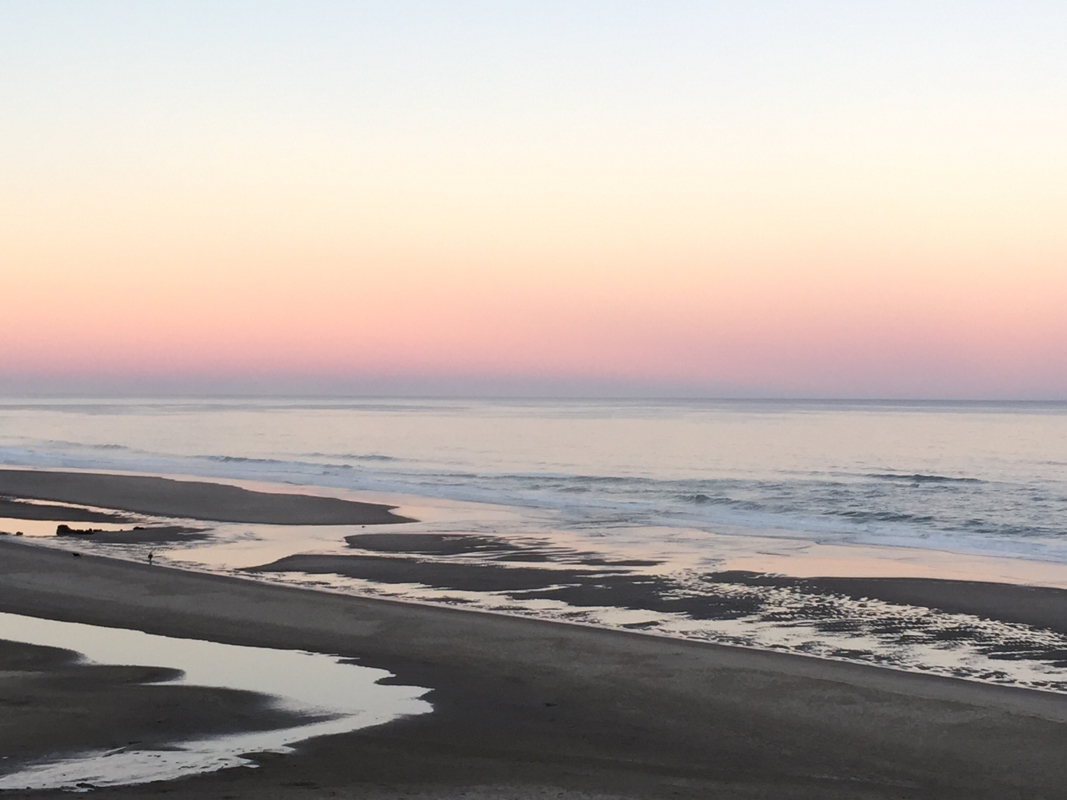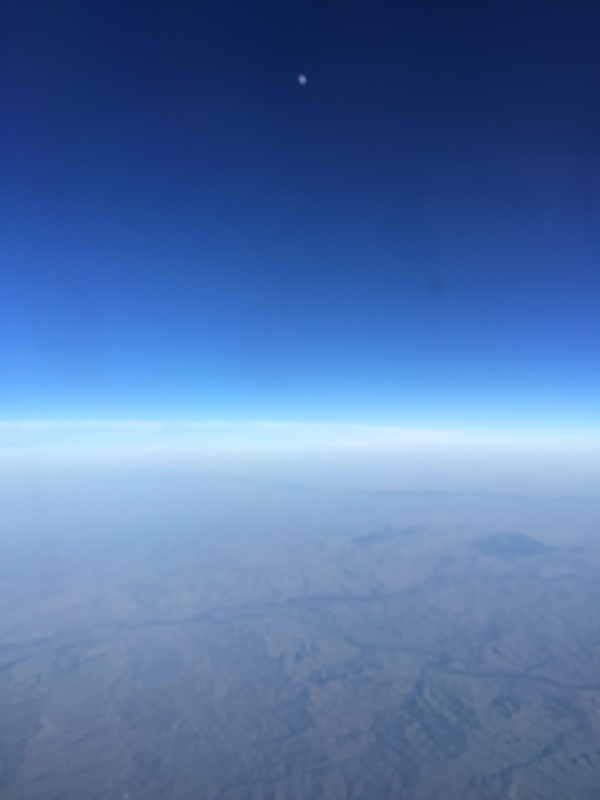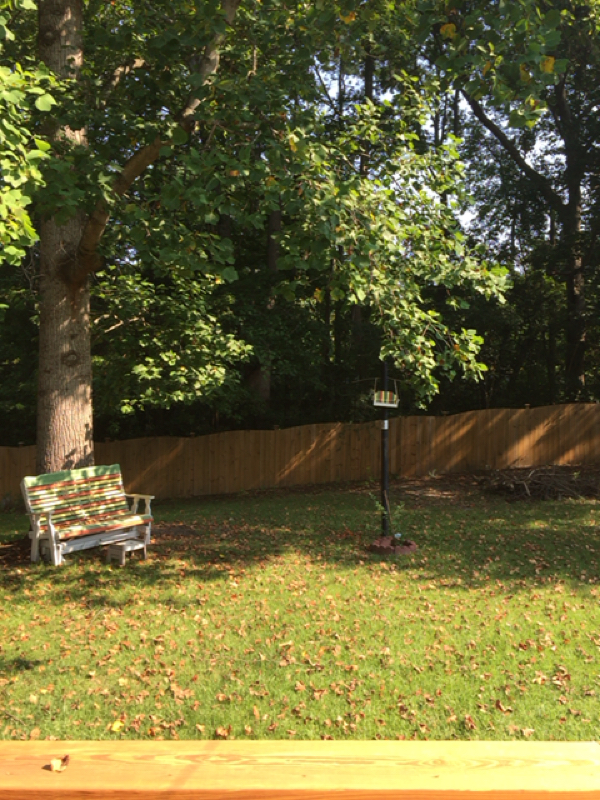|
"But sunrise is so special: My soul feels that we have always known each other. You are my brahma muhutra." There's something about sunrise that allows us to breathe deep, lungs expanding into the new day but in a gentle way. This is how I begin most days of Earth Joy Writing: by looking around me and breathing, and then writing down what I see around and inside me. The quote above comes from my novel, Shamrock and Lotus. In the story, characters from India and Ireland and America make journeys from the east to the west coast of Ireland to heal their pasts through encounters with the land. Here I am, this sunrise morning, having come from the east to the west coast of America with my brahma muhutra, whose birthday is today! Such earth. Such joy. Such writing. Such a lovely beginning of this new day. May sunrise bring you gentle expansion as you breathe into the beauty of who you were born to be.
0 Comments
The earth is a castle of clouds And loud rivers that hum Quietly from above. The moon is an eye That follows our why And sings a silent lullaby. Every journey begins with between The old and the next thing In the courageous beauty of being seen. - Join me for the EarthJoyWriting book tour in Oregon this week! Click the Book Tour page to learn more. This is my view right now. Facing north from the back porch of home. Sometimes we leave home, as much as we love it, so our bodies, minds and spirits can grow. Travel does this. Long ago, I had a roommate from Iceland who told me that there is a word in Icelandic that means "stupid" and also "never left home." The next time you hear from me, I'll be in Oregon. And a little smarter. But there is so much about the South that I love. And I will take the wisdom of home with me to the Pacific Northwest and we will all be a little smarter then. Let the EarthJoyWriting book tour begin! I’m about to leave for the Earth Joy Writing Book Tour! I’ll be blogging here daily to share insights, discoveries, and images along the way. In the meantime, here’s your reflection for today…
When I was in my mid-twenties, I was part of a women’s group that met once a month in the evenings to discuss readings about politics, the environment, religion, women’s health, and our emotional lives. It was not the first women’s group I was ever in, nor was it the last, but it was very special because of its diversity—women from twenty-one to sixty-one, from different backgrounds, regions, religions, races, and classes. I was one of the younger women, and I admired and appreciated the wisdom of the ones who had had long marriages, and children, and loss, and skills for living. Among them was a woman I’ll call Betsy. Betsy’s birthday was coming, and for reasons I can’t quite remember now, I didn’t have time to get her a present, so I wrote her a card and mailed it. A couple weeks went by, and the next meeting was at Betsy’s house. After we had gathered our cups of tea and glasses of wine and plates of snacks, we sat in a circle in Betsy’s lovely living room, surrounded by art and pictures of her lawyer husband and beautiful children. I was feeling young, and poor, and underemployed. And then Betsy suddenly jumped up and said, “Wait! Before we begin, I want to read you Cassie’s poem!” What, I thought to myself, is she talking about? What poem? And she proceeded to take the birthday card I had sent her off the mantel and read it out loud. What she read were the words that became the poem “Wishes.” Wishes the wind across your porch the rose and its cycles your husband’s patience your children’s laughter how flowers prosper sunlight a turtle in your yard lizards on white wood African dance letters from friends books you get lost in how leaves come and go the opposite of pain wind from the North in summer wind from the South in winter wind from the West most days wind from the East when we need rain butterflies in daylight moths at moon dragonfly hawk philosophy dreams hunger food ~ I had not meant it as a poem. But lovely Betsy saw it as a poem. And so it became one: Later that evening, I copied the words from the card onto a scrap of paper so I could take them home and type them up and make them a poem. This is how we co-create. We allow people to see in us what we cannot yet see. And we rise to their vision. -- As I get ready to leave for the Earth Joy Writing Book Tour, I’d love to hear how co-creating with others has helped you over the course of your lifetime. Leave a comment below and let me know how Earth Joy Writing is helping you rise to a higher vision. In just a couple days, I’ll be heading to Oregon for the Earth Joy Writing Book Tour! I’ll be blogging here daily to share insights, discoveries, and images along the way… Today we continue our reflections on the 3 mistakes environmental writers make. (See the last two days’ posts for steps 1 and 2.) 3. Don’t look. Book. As writers, we can have a push-pull relationship to the writing world. We crave community to a certain extent, and we certainly want recognition, but we hoard our solitude and can find ourselves feeling off-balance from too much openness. Environmental writers have a particular paradox in this regard because we know that creating community is essential for environmental action. But sometimes this leads us to track others’ writing and research like hungry dogs and we forget to do our own best work. You are meant to write what no one else can write. No one else has your particular story, your quirky list of 20 things you love about nature, your own way of observing what is around you through the lens of your own body’s history. Stop looking at what others have written and begin to write from your own unique perspective. Writing tip: Take a hiatus from reading for one day. Instead, every time you reach for your phone or computer or tablet or book beside your couch, pick up a journal and write by hand instead. Research shows that 20 minutes of handwritten journaling can lead to healing of chronic stress and create brain activity similar to meditation. Try this for one day, and see what unique writing you can do. - I’d love to hear how journaling helped you write in new ways today. Leave a comment below and let me know how Earth Joy Writing is helping you be a better environmental writer. In a few days, I’ll be heading to the Oregon for the Earth Joy Writing Book Tour! I’ll be blogging here daily to share insights, discoveries, and images along the way…
Today we continue our reflections on the 3 mistakes environmental writers make. (See yesterday’s post for Step 1.) Step 2: Don’t fight. Write. Keeping our focus on the “enemy,” whether it’s corporations or governments or technologies that contribute to the degradation of the environment, strengthens the parts of our brain that allow us to compare, criticize, judge, and edit. But although these can be immensely helpful at later stages of writing, in the beginning, these can block us from our inner sense of connection to the intuition, feeling, and wisdom within. Creativity comes from “long thoughts” and the connections between disparate things through which we create meaning. Fighting against, though, can obstruct us from the new ideas and innovations that ultimately will lead to solutions and breakthroughs. Writing tip: Make a list of 20 things you love about the natural world. Get specific. The smell of a Bradford pear that reminds you of a high school boyfriend? The warmth that rises from the earth during a summer rain? After making your list, see what new ideas you have for your environmental writing. Make a note of at least 3. -- I’d love to hear how you are paying attention to what you love in nature today. Leave a comment below and let me know how Earth Joy Writing is helping you understand the importance of beginning with love in your writing. In a few days, I’ll be heading to the Oregon for the Earth Joy Writing Book Tour! I’ll be blogging here daily to share insights, discoveries, and images along the way… But in the meantime, I thought I'd share the 3 biggest mistakes that I see environmental writers make.
My earliest writing was done near a window. During my childhood in Minnesota, it was often too snowy to go outside, but my second-floor bedroom window was near a tree, and I sat by that tree like some devotees sit near their guru. As a teen, I started writing outdoors. We’d moved to Washington, DC, by then, and I often sat on a bench near the Capitol waiting for my mom to finish work so we could carpool home. It seemed to me that I needed that sense of a context – the tree outside my window or the birds in the trees in the middle of the city – to give me the courage to tell the truth in my writing. Nature was a witness that allowed me to feel heard even when the words had not yet been shared. Over the years, I’ve published a novel and several poetry books with nature themes and I’m about to do a book tour for my book, Earth Joy Writing: Creating Harmony through Journaling and Nature, which was released on Earth Day, April 22nd. Along the way, I’ve noticed 3 mistakes that I have made myself and I often see environmental writers making, and I’d like to share them with you over the next three days. 1. Don’t think. Sit. Sometimes because of our concern for the earth, we begin writing with a premise. A goal. An outcome. But as Hemingway said, “Remarks are not literature.” It took me a long time to learn this. I had to learn to be patient and let the language lead me where it wanted to go. I had to step away from the statistics and the dire predictions and let imagination take the reins. Writing tip: Go outdoors for 10 minutes and do nothing. Don’t write. Don’t brainstorm. Don’t plan. Just observe what is around you. Be with the natural world in a way, perhaps, you’ve forgotten. Then let yourself write. See what happens. -- I’d love to hear how you are just sitting today. Leave a comment below and let me know how Earth Joy Writing is helping you understand the importance of being present to your writing. At the end of this week, I’ll be heading to the Oregon for the Earth Joy Writing Book Tour! I’ll be blogging here daily to share insights, discoveries, and images…
Today we move into the third step of our deep, mindful listening process. (See the last two posts for the first two steps.) Step 3: Now listen to yourself. We cannot really listen to our deepest selves until we learn to listen to others. That friend who always talks about herself? And how boring and annoying she is? It’s because she doesn’t really listen to the world or to others. So after spending some time in mindful listening for the last two days, now we are ready to move to listening to ourselves. ~ Write in your journal for 1 minute in response to each of the following statements. Time yourself so you put sacred boundaries around your writing. This will enable you to go deeper, knowing that the time is limited and you must go directly into the truth of what you want to say and that you will be able to come back up from that deep place of truth fairly soon. Write whatever comes. Do not censor or criticize or cross out. Keep writing. Allow yourself to say what needs to be said. What I want to say is… I am afraid to write about… I dream of writing about… If I had the courage, my writing would focus on… ~ I’d love to hear how you are listening more deeply today. Leave a comment below and let me know how Earth Joy Writing is helping you understand the importance of listening to others in your own life. At the end of this week, I’ll be heading to Oregon for the Earth Joy Writing Book Tour! I’ll be blogging here daily to share insights, discoveries, and images. But in the meantime.
It’s Monday. Back to work. Back to shuttling kids back and forth to camp. As we continue to reflect on mindful listening today, we take another step on the journey we began yesterday. Step 2: Listen to someone else. You may have someone in your life you take for granted. Perhaps this is an acquaintance or a neighbor that you are friendly with but have never really listened to before. Perhaps it is a complete stranger who catches your eye in the subway or a coffee shop. Perhaps it is a dear friend or family member that you haven’t contacted in a while. Decide that for ten minutes, you will listen. Really listen. Try to hear the song underneath the song that they are singing. What are the feelings behind the words that they are saying? How can you listen in a way that lets this person know s/he is being heard? How can your listening be a gift that enables this person to sing a deeper, more meaningful song? After listening, turn to your journal to reflect on the experience. What did your companion say? How did you listen in a new way? Were you quiet or did you respond? What came out that was enabled by your mindful listening? -- I’d love to hear how you are listening more deeply today. Leave a comment below and let me know how Earth Joy Writing is helping you understand the importance of listening to others in your own life. In a little over a week, I’ll be heading to the Pacific Northwest for the Earth Joy Writing Book Tour! I’ll be blogging here daily to share insights, discoveries, and images… Today we reflect on the importance of beginning to listen.
Humans are not very good at listening. We can prefer the life of the mind, and in our minds, we can get stuck in a loop of listening to ourselves telling the same stories over and over. “I have to say yes to this obligation.” “There’s not enough time for self-care.” “I can’t be my true self at work.” In the next three days, I will share 3 Earth Joy Writing steps to help you listen more mindfully. Step 1: Listen to the world. Spend some time today listening to all the beautiful sounds all around you. Start where you live. Listen to the hum of your refrigerator filled with food, or the heat in your building keeping you warm. Listen to what is always vibrating in its own beauty that you don’t usually take the time to notice. Then go outside. Listen to the birds. The traffic. The airplane overhead. Perhaps you will hear children's voices. Music on the radio. The wind in the trees. Now go about your day, your ears opened to all the beauty that we take for granted and overlook in the world. Listen to your own heartbeat. Listen to the silence between the sounds. Realize that the world is making music for us all the time, and in order to be in harmony, all we have to do is listen with open ears and an open mind. After spending a day listening in this open way, take ten minutes to record what you heard. Try to list every sound you remember. You might find that the sounds themselves live on the page, too. You might find yourself writing a poem—or a song. -- I’d love to hear how you are listening more deeply today. Leave a comment below and let me know how Earth Joy Writing is helping you understand the importance of listening in your own life. |
AuthorCassie Premo Steele, Ph.D., is the author of 13 books and a writing coach. Archives
November 2015
|




 RSS Feed
RSS Feed